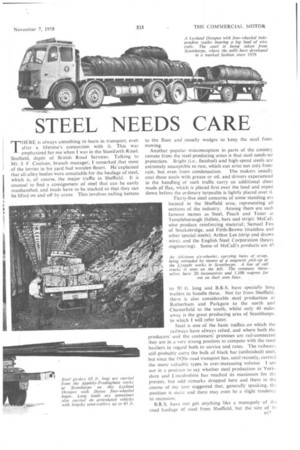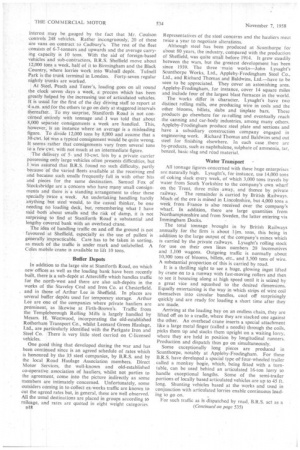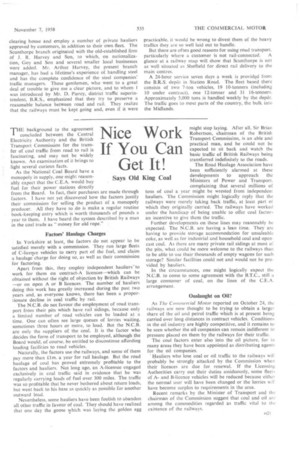STEEL NEEDS CARE
Page 71

Page 72

Page 75

If you've noticed an error in this article please click here to report it so we can fix it.
THERE is always something to learn in transport, even after a lifetime's connection with it. This was emphasized for me when I was in the Staniforth Road, Sheffield, dept)t of British Road Services. Talking to Mr. J. F. Coulson. branch manager, I remarked that most of the lorries in his yard had wooden floors. He'explained that all-alloy bodies were unsuitable for the haulage of steel, which is, of course, the major traffic in Sheffield. It is unusual to find a consignment of steel that can be easily manhandled, and loads have to be stacked so that they can be lifted on and off by crane. This involves nailing battens
to the floor and usually wedges to keep the steel from moving.
Another popular misconception in parts of the country remote from the steel-producing areas is that steel needs no protection. Bright (i.e., finished) and high-speed steels are extremely susceptible to rust, which can arise not only from rain, but even from condensation. The makers usually coat these steels with grease or oil, and drivers experienced in the handling of such traffic carry an additional sheel made of flax, which is placed first over the load and roped down before the ordinary tarpaulin is lightly placed over it.
Thirty-five steel concerns of some standing are located in the Sheffield area, representing all sections of the industry. Among them are such famous names as Steel, Peach and Tozer at Templeborough (billets, bars and strip); McCall, who produce reinforcing material; Samuel Fox of Stocksbridge, and Firth-Brown (stainless and other special steels); Arthur Lee (strip and drawn wire), and the English Steel Corporation (heavy engineering). Some of McCall's products are 45 to 50 ft. long and B.R.S. have specially long trailers to handle these. Not far from Sheffield. there is also considerable steel production at Rotherham and Parkgate to the north . and Chesterfield to the south, whilst only 40 miles away is the great producing area of Scunthorpe. to which I will refer later.
Steel is one of the basic traffics on which the railways have always relied, and where both the producers' and the customers' premises are rail-connected they are in a very strong position to compete with the road hauliers in regard both to service and rates. The railway, still probably carry the bulk of black bar (unfinished) steel. but since the I 920s road transport has, until recently, carried the more valuable types in ever-increasing volume. I ant not in a position to say whether steel production in Yorkshire and J.incolnshire has reached its maximum for the present, but odd remarks dropped here and there in the course of my tour suggested that, generally speaking, the position is static and there may even be a slight tendency to recession.
B.R.S. have not got anything like a monopoly of the road haulage of steel from Sheffield, but the size of ifs: oI7 interest may be gauged by the fact that Mr. Coulson controls 248 vehicles. Rather incongruously, 20 of these are vans on contract to Cadbury's. The rest of the fleet consists of 6-7-tonners and upwards and the average carrying capacity is 10 tons. With the aid of foreign-based vehicles and sub-contractors, B.R.S. Sheffield move about 12,000 tons a week, half of it to Birmingham and the Black Country, where lorries work into Walsall depot. Tufnell Park is the trunk terminal in London. Forty-seven regular nightly trunks are worked.
At Steel, Peach and Tozer's, loading goes on all round the clock seven days a week, a process which has been greatly helped by the increasing use of articulated vehicles. It is usual for the first of the day driving staff to report at 4 a.m. and for the others to go on duty at staggered intervals thereafter. To my surprise, Staniforth Road is not concerned entirely with tonnage and I was told that about 8 ,000 separate consignments a week are handled. This, however, is an instance where an average is a misleading figure. To divide 12,000 tons by 8,000 and assume that a 30-cwt. lot was a typical consignment would be quite wrong. It seems rather that consignments vary from several tons to a few cwt. with not much at an intermediate figure.
The delivery of 5and 10-cwt. lots by a private carrier possessing only large vehicles often presents difficulties, but
was assured that B.R.S. found no such difficulty, partly because of the varied fleets available at the receiving end and because such smalls frequently fall in with other bits and pieces for the same destination. Samuel Fox of Stocksbridge are a concern who have many small consignments and there is a standing arrangement to clear these specially twice a week. An undertaking handling hardly anything but steel would, to the casual thinker, be one needing no loading deck, but, remembering what I have said -both about smalls and the risk of damp, it is not surprising to find at Staniforth Road a substantial and lengthy covered bank with an overhead ci-ane.
The idea of handling traffic on and off the ground is not favoured at Sheffield, especially is the use of pallets/ is generally impracticable. Care has to be taken in sorting, as much of the traffic is under mark and unlabelled. A Coles mobile crane is available to lift 10 tons.
Buffer Depots
In addition to the large site at Staniforth Road, on which new offices as well as the loading bank have been recently built, there is a sub-depot at Attercliffe which handles traffic for the north-west and there are also sub-depots in the works of the Staveley Coal and Iron Co. at Chesterfield, and in those of Arthur Lee in Sheffield. In places are several buffer depots used for temporary storage. Arthur Lee are one of the companies where private hauliers are prominent, as likewise at Firth-Brown's. Traffic from the Templeborough Rolling Mills is largely handled by Messrs. H. Westwood, incorporating the old-established Rotherham Transport Co., whilst Leonard Green Haulage, Ltd., are particularly identified with the Parkgate Iron and Steel Co. There is very little steel carried on C-licensed vehicles.
One good thing that developed during the war and has been continued since is an agreed schedule of rates which is honoured by the 35 steel companies, by B.R.S. and by the local Road Haulage Association members. Direct Motor Services, the well-known and old-established co-operative association of hauliers, whilst not parties to the agreement, come into the picture indirectly as some members are intimately concerned. Unfortunately, some outsiders coming in to collect ex-works traffic are known to cut the agreed rates but, in general, these are well observed. All the usual destinations are placed in groups according to mileage, and rates are quoted in eight weight categories.
n18 Representatives of the steel concerns and the hauliers meet twice a year to negotiate alterations.
Although steel has been produced at Scunthorpefor about 80 years, the industry, compared with the production of Sheffield, was quite small before 1914. It grew steadily between the wars, but the greatest development has been since 1939. The three main works—John Lysaght's Scunthorpe Works, Ltd., Appleby-Frodingham Steel Co., Ltd., and Richard Thomas and Baldwins, Ltd.—have to be seen to be appreciated. They cover an astonishing area. Appleby-Frodingham, for instance, cover 14 square miles and include four of the largest blast furnaces in the world.
The works differ in character. Lysaght's have two distinct rolling mills, one producing wire in coils and the other blooms, billets, slabs and tinplate bars. These products go elsewhere for re-rolling and eventually reach the canning and ,car-body industries, among many others. Appleby-Frodingham produce steel plate and sections and have a subsidiary construction company engaged in engineering work. Richard Thomas and Baldwins send out steel for finishing elsewhere. In each case , there are by-products, such as naphthalene, sulphate of ammonia, tar, benzol, basic slag and road material.
Water Transport
All tonnage figures concerned with these huge enterprises are naturally high. Lysaght's, for instance, use 14,000 tons of coking slack eyery week, of which 3,000 tons travels by water from South Yorkshire to the company's own wharf on the Trent, three miles away, and thence by private railway. The remainder is carried by British Railways. Much of the ore is mined in Lincolnshire, but 4,000 tons a week from France is also received over the company's wharf. In addition, there are large quantities from Northamptonshire and from Sweden, the latter entering via Immingham Docks.
The total tonnage , brought in by British Railways annually for the firm is about lim. tons, this being in addition to the large output of the company's mines which is carried by the private railways. Lysaght's rolling stock for use on their own lines numbers 20 locomotives and .1,100 wagons. Outgoing traffic is normally about 10,300 tons of blooms, billets, etc., and 3,500 tons of wire. A substantial proportion of this is carried by road.
It is a thrilling sight to see a huge, glowing ingot lifted by crane on to a runway with fast-moving rollers and then to see it bouncing along at high speed until it is seized by a great vice and squashed to the desired dimensions. Equally entertaining is the way in which strips of wire coil themselves into circular bundles, cool off surprisingly quickly and are ready for loading a short time after they are made.
Arriving at the loading bay on an endless chain, they are lifted off on to a cradle, where they are stacked one against the other. An overhead crane inserts a special attachment like a large metal finger (called a needle) through the coils, picks them up and stacks them upright on a waiting lorry, where they are held in position by longitudinal runners.• Production and dispatch thus go on simultaneously.
Some exceptionally long pieces are produced in Scunthorpe, notably at Appleby-Frodingham. For these B.R.S. have developed a special type of four-wheeled trailer called a monkey bogie, which, being fitted with a turntable, can be used behind an articulated 16-ton lorry to handle exceptional lengths. Some of the semi-trailer portions of locally based articulated vehicles are up to 45 ft. long. Shunting vehicles based at the works and used in conjunction with articulated lorries enable continuous loading to go on.
For such traffic as is dispatched by road, B.R.S. act as a (Continued on page 535) clearing house and employ a number of private hauliers approved by customers, in addition to their own fleet. The Scunthorpe branch originated with the old-established firm of J. R. Harvey and Son, to which, on nationalization, Goy and Son and several smaller local businesses were added. Mr. Arthur Harvey, the present branch manager, has had a lifetime's experience of handling steel and has the complete confidence of the steel companies' traffic managers. These gentlemen, who went to a great deal of trouble to give me a clear picture,. and to whom I was introduced by Mr, D. Piercy, district traffic superintendent, B.R.S., emphasized that they try to preserve a reasonable balance between road and rail. They realize that the railways must be kept going and, even if it were practicable, it would be wrong to divest them of the heavy traffics they are so well laid out to handle.
But there are often good reasons for using road transport, particularly where a customer is not rail-connected. A glance at a railway map will show that Scunthorpe is not as well situated as Sheffield for direct rail delivery to the main centres.
A 24-hour service seven days a week is provided from the B.R.S. depot in Station Road. The fleet based there consists of two 7-ton vehicles, 19 10-tonners (including 10 under contract), one 12-tanner and 31 16-tonners. Approximately 5,000 tons is handled weekly by the depot. The traffic goes to most parts of the country, the bulk into the Midlands.












































































































































